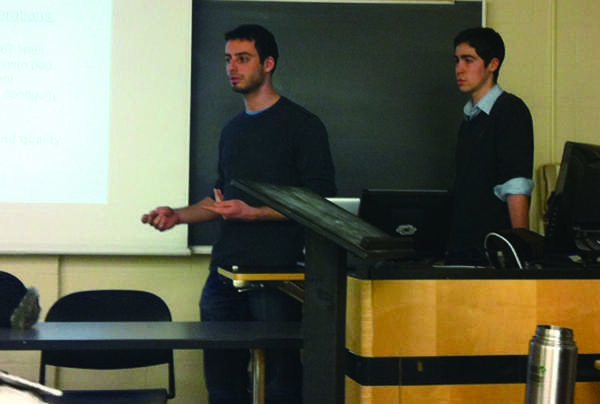Students talk two-state solution for the Israel-Palestine conflict

Elizabeth Kim/The Daily Northwestern
J Street U Northwestern members lead a discussion Wednesday night on issues involved in drawing the borders of Israel and Palestine at Kresge Hall. The discussion was a response to ongoing negotiations between Israel and Palestine.
March 5, 2014
Several Northwestern students discussed a two-state solution for Israel and Palestine on Wednesday in the first of four educational initiatives by J Street U.
About 12 students attended the discussion in Kresge Hall titled, “Peace is Possible – Borders,” facilitated by two co-founders of the NU chapter of J Street U, a student organization promoting student engagement of the Israel-Palestine conflict.
“I would just like to see more students get involved, more educated and spreading the word,” said Medill sophomore Tal Axelrod, a co-founder of NU’s J Street U and a former Daily staffer. “I think this conflict is extremely important. It’s an exciting time, and I do think there is enough interest on this campus.”
The event involved a brief history of the conflict, a presentation of three videos and a discussion after each video. The discussions brought in various perspectives clarifying what the two-state negotiations entailed and what the implications would be for both Israelis and Palestinians.
“I guess I’ve been concerned about how everyone is quiet about the Israeli-Palestinian issue,” said Jacqueline Soria, a SESP sophomore. “I think it’s important to talk about pro-peace and pro-compromise.”
The discussion was organized to not only educate students on the issue from a neutral standpoint but also to spark conversations about what can be a sensitive topic on campus. Students mentioned two campus groups, Students for Justice in Palestine and Wildcats for Israel.
“People have views that don’t really fit in either of these groups,” Axelrod said. “There are negotiations for peace happening right now. So let’s talk about it right now.”
This first discussion focused on explaining the borders proposed by the ongoing negotiations, though the three educational sessions later in the year will elaborate on border security, Jerusalem and refugees.
J Street U hopes to create more safe spaces to encourage the larger student body to feel comfortable sharing thoughts on a critical issue for both Israel-Palestine and the United States.
“What role do we have as American government and students in questions of borders?” asked Weinberg junior Josh Boxerman, co-founder of NU’s J Street U.
Email: [email protected]

